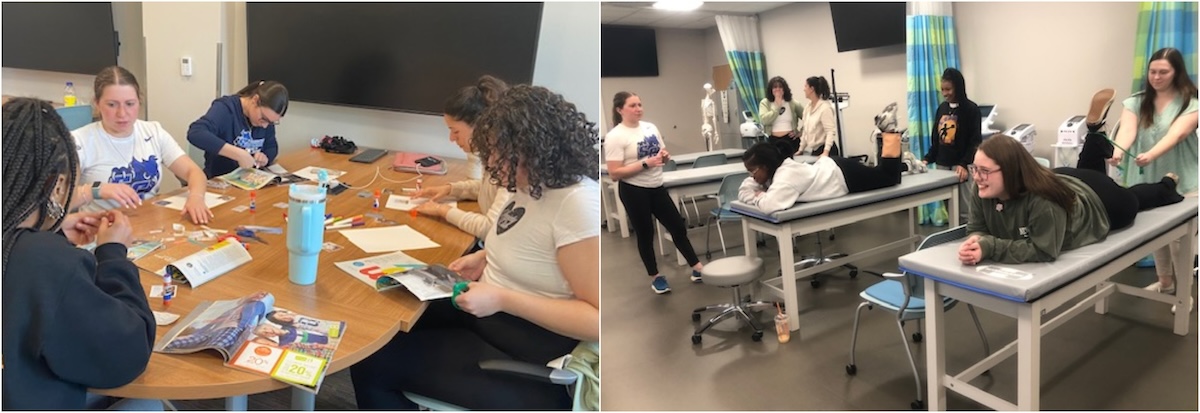
Interprofessional education (IPE) is an approach where students can learn from and with others from different disciplines. The aim is to improve collaboration, person-centered care, and health outcomes. Our Interprofessional Research Education and Practice (IPREP) initiative uses the IPEC Core Competencies as a guide to facilitate learning outcomes (see IPEC Core Competencies). The World Health Organization and Institute of Medicine highlight the importance of interprofessional education as a critical step in preparing a collaborative, practice-ready healthcare workforce that is best equipped to respond to health needs.
The mission of the College of Health and Human Services’ Interprofessional Research Education and Practice (IPREP) initiative is to provide learners with exceptional interprofessional educational experiences. IPREP serves as a resource for faculty, staff, and students seeking interprofessional education and research.
Our vision is that each student who graduates from the College of Health and Human Services, regardless of major or area of study, will have the opportunity to participate in interprofessional education, practice, and/or research opportunities and understand the importance of engaging in and advocating for interprofessional collaboration.
Examples of Interprofessional Education Activities that IPREP uses to engage learners are:
Simulated Scenarios
Learners from different disciplines work together in simulated patient care scenarios to practice and refine their collaborative skills.
Case-Based Learning
Interdisciplinary teams analyze and discuss patient cases, focusing on integrated care approaches.
Service Learning Projects
Learners collaborate on community-based projects to address real-world health issues, applying their diverse skills and knowledge.
- Creating Inclusive Spaces, April 11, 2025: The 1/2 day event highlighted ways to fully include individuals in all aspects of life, through adaptations and modifications to play, leisure, and self-care activities. Faculty facilitators and student attendees represented the professions of Speech-Language Pathology, Occupational Therapy, Physical Therapy, Recreation Therapy, and Nursing, from both Southern CT State University and Quinnipiac University. IP student groups worked together in activity modification and implementation with a young man who requires the use of a wheelchair and communication devices, and his family.
- AAC/AT Expo, October 4, 2024: The event highlighted the use of assistive technology to improve play and communication for clients. Presenters and attendees represented the professions of Speech-Language Pathology, Occupational Therapy, and Special Education. See Photos.
- AAC/AT Expo, October 20, 2023: The event highlighted the use of assistive technology to improve play and communication for clients. Presenters and attendees represented the professions of Speech-Language Pathology, Occupational Therapy, and Special Education. See Photos.
- College of Health & Human Services IPE Event, April 6, 2022: Exploring the impact of COVID-19 on Health Practices and Health Professionals: An Interprofessional Education Event.
- College of Health and Human Services IPE Day, Nov 12, 2021: Social determinants of health
- College of Health and Human Services IPE Day, April 23, 2021: Panel presentation by the West Haven Veterans Association ALS Team, including Primary Care, Social Work, Psychology, Palliative Care, PT, OT, SLP, and a patient with ALS.
- Interprofessional Education Day Feb 23, 2018
Papers
Papers in reverse chronological order by year of publication.
2025
Bright, H., Archambault, M., Ramella, K., Montgomery, S., and Warden, K. (2025). Interprofessional Education and Collaborative Practice: A Brief Report of Health Professions Organizations and Recommendations for Recreational Therapy: IPECP. Therapeutic Recreation Journal
2023
Warner, H., & Cometz, A. (2023). Interdisciplinary considerations for diagnosing aphasia in the schizoaffective patient: A case report. International Journal of Language & Communication Disorders, 58(2), 433-440.
2020
Weiss, D., Cook, B., & Eren, R. (2020). Transdisciplinary approach practicum for speech-language pathology and special education graduate students. Journal of Autism and Developmental Disorders, 50, 3661-3678.
2019
O’Brien, K. H., & Lushin, V. (2019). Examining the impact of psychological factors on hospital length of stay for burn survivors: A systematic review. Journal of Burn Care & Research, 40(1), 12-20.
2018
Miller Kuhaneck, H., & Kelleher, J. (2018). The classroom sensory environment assessment as an educational tool for teachers. Journal of Occupational Therapy, Schools, & Early Intervention, 11(2), 161-171.
2014
Warner, H. L., Suiter, D. M., Nystrom, K. V., Poskus, K., & Leder, S. B. (2014). Comparing accuracy of the Yale swallow protocol when administered by registered nurses and speech‐language pathologists. Journal of Clinical Nursing, 23(13-14), 1908-1915.
2012
Kuhaneck HM, & Chisholm EC. (2012). Improving dental visits for individuals with autism spectrum disorders through an understanding of sensory processing. Spec Care Dentist. 32(6):229-33. doi: 10.1111/j.1754-4505.2012.00283.x. PMID: 23095065.
Presentations
2024
Garrison, B. Roy, J. & Coleman, K. (2024). Facilitators and Barriers for Faculty Implementation of Interprofessional Education: A Pilot Study. ASAHP Annual Conference, October 8-10, Atlanta, GA. Annuyal.
Petrini, J. (2024). Breaking Barriers: Assessing The Impact Of A Health Informatics Capstone Course On Research Anxiety. ASAHP Annual Conference, October 8-10, Atlanta GA.
Smith, J.B. & Garrison, B. (2024, November). Exploring the Intersection of Social Work and SLP in Pediatric Aerodigestive Disorders. 2024 Society for Ear, Nose, Throat Advancement in Children Annual Meeting, Denver, CO.
2022
Purdy, M. (2022). Podcast: Episode #84: Interprofessional Practice and Interprofessional Education: In Conversation with Mary Purdy.
2021
Archambault, M. & Bright, H. (2021). Advocating for Recreational Therapy Participation in Interprofessional Education. Presented virtually for the annual ATRA Conference
Archambault, M., Strange, V., Doyle, M., Cook, B., Majeski, K., & Booth, J. (2021). Using Videoconferencing to Promote Greater Access to and Diversity of Professions in a Recurring Interprofessional Event Involving Three Universities. Poster presentation at the IPEC Virtual Poster showcase.
Strange, V., Doyle, M., Cook, B., Majeski, K., Archambault, M., Falaro, J., & Smith, C. (2021). An Interprofessional Approach to Care for a Child with Complex Medical Challenges. Poster presentation at Jefferson Center for Interprofessional Practice and Education: Interprofessional Care for the 21st Century.
2018
Purdy, M., Krieger, J., Rothbard, M., & Archambault, M. (2018). Promoting IPE through an interclass project: Success & challenges. Poster Presentation ASHA Convention. Boston, MA.
2017
Aronson, B. Hindenlang, J., Krieger, J., Purdy, M., Archambault, M.J. & Rothbard, M. (2017). Interprofessional Education: Bringing the Faculty Together. A faculty-led grassroots effort to bring together teaching and clinical faculty from all School of Health and Human Services departments, in a collaborative forum to create innovative approaches aimed at developing IPE experiences for faculty and students.
Gesino, J. & Archambault, M. (2017). Rewiring the Brains of Elders: Helping Elders to Thrive. Presented at the Aging: Strategies to Enhance Health and Well-being conference at Southern Connecticut State University, New Haven, CT.
Robillard, M., Purdy, M., Krieger, J., and Archambault, M. (2017). Interprofessional Education at Southern Connecticut State University. Poster presentation for Interprofessional Education: Building a Framework for Collaboration. IPEC Institute, Washington, DC.
Faculty Grants
2024
Garrison, B. & Smith, J.B. (2024). Bridging the Gap: Interprofessional Collaboration to Address Mental Health in Individuals with Communication Disorders. Josiah Macy Jr. Foundation President's Grant, award of $25,000.
Smith, J.B. & Wasiuk, P. (2024). Embedding Interprofessional Education into Graduate Speech-Language Pathology Research and Capstone Curricula. Southern Connecticut State University, Curriculum Related Activity Grant, award of $3,661.
Smith, J.B. & O’Brien, K. (2024). Enhancing Faculty Competency in Interprofessional Education Development. Southern Connecticut State University Short-Term Faculty Development Grant, award of $1,000.
Tucker, L. & Kuhaneck, H. (2024) Exploring Artificial Intelligence (AI) for Higher Education Learning. Southern Connecticut State University, Faculty Development Grant, award of $1,000.
2022
Smith, J.B., & Warner, H. (2022). Incorporating interprofessional and simulation experiences into the classroom to prepare future Speech-Language Pathologists for medical settings. Southern Connecticut State University, Curriculum Related Activity Grant Proposal, Award of $5,000.
Work in Progress
Archambault,M.J. & Kuhaneck, H.M. Interprofessional perceptions of recreation therapy and occupational therapy practitioners.
Penny, F., Smith, J.B. & Griswold, M. An Interprofessional Breastfeeding Simulation in the Home Care Setting.
Archambault, M. & Terpstra, J. Exploring leisure curriculum and implementation for individuals in transition programs: Implications for transition.
Students in various HHS programs are able to engage in interprofessional learning activities embedded throughout their curricula. The following are some of the annual activities that students engage in, in order to learn from each other.
Students in Speech-Language Pathology and Nursing engage in simulations to consider the interprofessional aspects of evaluating and treating
- Clients with swallowing difficulties
- Clients with traumatic brain injuries and cognitive deficits
- Clients with tracheostomies and difficulty with speaking and swallowing
- Infant clients in the Neonatal Intensive Care Unit
Students in Athletic Training and Recreational Therapy have an opportunity each spring to teach each other specific skills. The Athletic Training students teach the Recreational Therapy students about exercises following an injury and the Recreational Therapy students teach the Athletic Training students specific activities for stress management. They engage in discussion about the similarities and differences between the two professions.

Students in Athletic Training and Nursing complete a musculoskeletal evaluation.
Students in Athletic Training and Speech-Language Pathology work together to examine the interprofessional aspects of evaluating and treating a client with concussion.
Students in Social Work and Speech-Language Pathology complete a simulated acute care family meeting.
Students in Social Work, Speech-Language Pathology, and Special Education, programs engage work together to provide services in the Southern Connecticut Sibshop: Facilitated by Zara Waldman DeLuca (CMD). The Southern Connecticut Sibshop is a group to support sibs (siblings of children with disabilities). Sibshop meets on the second Friday of the month for two hours. See more information at @heysibsister on Instagram.
Students in Occupational Therapy and Special Education will work together to adapt toys for more independent play.
Students in Occupational Therapy and Speech-Language Pathology will work together in clinical simulations for clients with feeding concerns and dysphagia and will role play a simulated IEP Meeting and a simulated discharge planning meeting.
Students in Occupational Therapy and Recreation Therapy will work together to provide leisure exploration and adapted leisure opportunities for the local community through the Institute for Adapted Sports and Recreation.
Students in Occupational Therapy and Nursing will complete role plays and simulated learning experiences in maternal child health, and stroke.
- Sept 27, 2024: Interprofessional Healthcare Education Summit, Quinnipiac University. Faculty from Social Work, Nursing, Speech-Language Pathology, Occupational Therapy, and Public Health attended a day-long educational opportunity to learn to develop a curriculum for students to meet accreditation standards in interprofessional healthcare education and apply IPCP in practice.
- May 17, 2024: Investing in Collaboration: Enhancing Faculty Competency in Interprofessional Education Development. Southern Connecticut State University. The IPREP Education Subcommittee put on a 4-hour educational session with experts from IU for SCSU faculty.
- Oct 8-11, 2023: Planetree International Conference on Patient-Centered Care, Boston MA. Faculty from Social Work, Nursing, Speech-Language Pathology, Occupational Therapy, and Public Health attended a 3-day conference to focus on embedding patient-centered care into all of our health professions programs.
If you have completed an IP event or activity and it is not yet listed here, please email Michell Vancour. We will be updating the webpage quarterly.
Submit an idea or plan for a new IP event that could be part of the HHS IPE Certificate.
